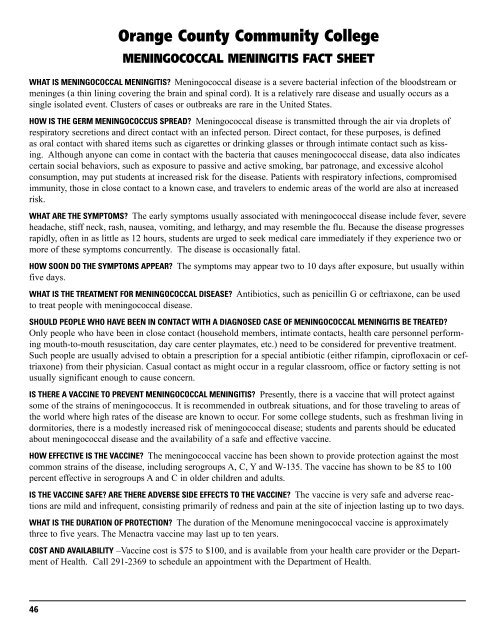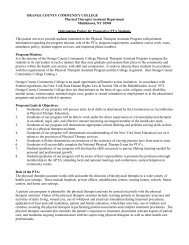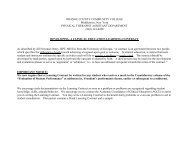Spring Summer 2010 - SUNY Orange
Spring Summer 2010 - SUNY Orange
Spring Summer 2010 - SUNY Orange
- No tags were found...
You also want an ePaper? Increase the reach of your titles
YUMPU automatically turns print PDFs into web optimized ePapers that Google loves.
<strong>Orange</strong> County Community CollegeMENINGOCOCCAL MENINGITIS FACT SHEETWHAT IS MENINGOCOCCAL MENINGITIS? Meningococcal disease is a severe bacterial infection of the bloodstream ormeninges (a thin lining covering the brain and spinal cord). It is a relatively rare disease and usually occurs as asingle isolated event. Clusters of cases or outbreaks are rare in the United States.HOW IS THE GERM MENINGOCOCCUS SPREAD? Meningococcal disease is transmitted through the air via droplets ofrespiratory secretions and direct contact with an infected person. Direct contact, for these purposes, is definedas oral contact with shared items such as cigarettes or drinking glasses or through intimate contact such as kissing.Although anyone can come in contact with the bacteria that causes meningococcal disease, data also indicatescertain social behaviors, such as exposure to passive and active smoking, bar patronage, and excessive alcoholconsumption, may put students at increased risk for the disease. Patients with respiratory infections, compromisedimmunity, those in close contact to a known case, and travelers to endemic areas of the world are also at increasedrisk.WHAT ARE THE SYMPTOMS? The early symptoms usually associated with meningococcal disease include fever, severeheadache, stiff neck, rash, nausea, vomiting, and lethargy, and may resemble the flu. Because the disease progressesrapidly, often in as little as 12 hours, students are urged to seek medical care immediately if they experience two ormore of these symptoms concurrently. The disease is occasionally fatal.HOW SOON DO THE SYMPTOMS APPEAR? The symptoms may appear two to 10 days after exposure, but usually withinfive days.WHAT IS THE TREATMENT FOR MENINGOCOCCAL DISEASE? Antibiotics, such as penicillin G or ceftriaxone, can be usedto treat people with meningococcal disease.SHOULD PEOPLE WHO HAVE BEEN IN CONTACT WITH A DIAGNOSED CASE OF MENINGOCOCCAL MENINGITIS BE TREATED?Only people who have been in close contact (household members, intimate contacts, health care personnel performingmouth-to-mouth resuscitation, day care center playmates, etc.) need to be considered for preventive treatment.Such people are usually advised to obtain a prescription for a special antibiotic (either rifampin, ciprofloxacin or ceftriaxone)from their physician. Casual contact as might occur in a regular classroom, office or factory setting is notusually significant enough to cause concern.IS THERE A VACCINE TO PREVENT MENINGOCOCCAL MENINGITIS? Presently, there is a vaccine that will protect againstsome of the strains of meningococcus. It is recommended in outbreak situations, and for those traveling to areas ofthe world where high rates of the disease are known to occur. For some college students, such as freshman living indormitories, there is a modestly increased risk of meningococcal disease; students and parents should be educatedabout meningococcal disease and the availability of a safe and effective vaccine.HOW EFFECTIVE IS THE VACCINE? The meningococcal vaccine has been shown to provide protection against the mostcommon strains of the disease, including serogroups A, C, Y and W-135. The vaccine has shown to be 85 to 100percent effective in serogroups A and C in older children and adults.IS THE VACCINE SAFE? ARE THERE ADVERSE SIDE EFFECTS TO THE VACCINE? The vaccine is very safe and adverse reactionsare mild and infrequent, consisting primarily of redness and pain at the site of injection lasting up to two days.WHAT IS THE DURATION OF PROTECTION? The duration of the Menomune meningococcal vaccine is approximatelythree to five years. The Menactra vaccine may last up to ten years.COST AND AVAILABILITY –Vaccine cost is $75 to $100, and is available from your health care provider or the Departmentof Health. Call 291-2369 to schedule an appointment with the Department of Health.46
















